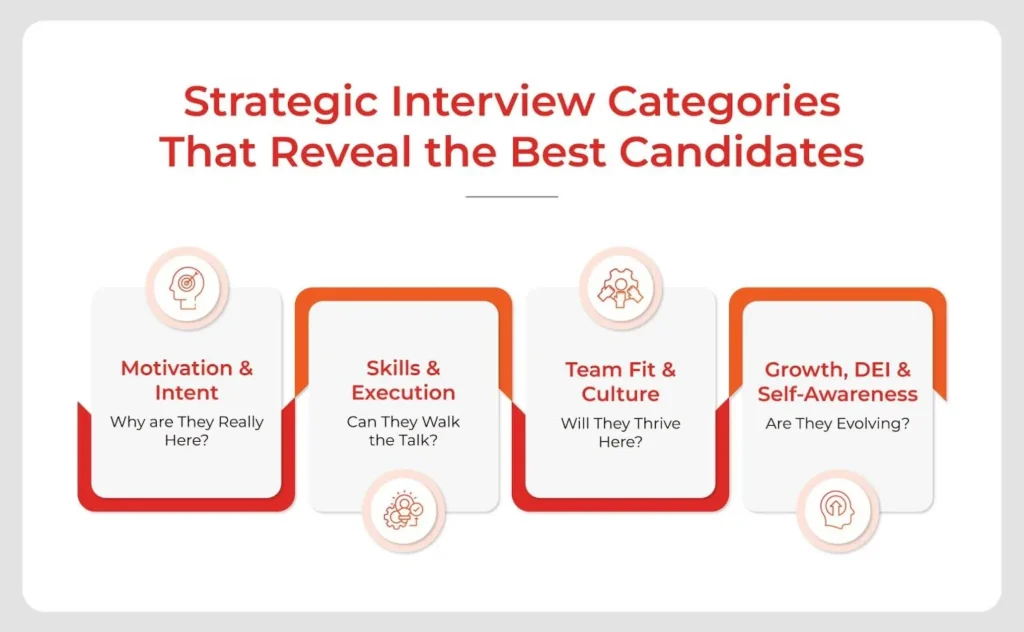Hiring may be a constant for businesses, but the rules of engagement have shifted. With talent shortages, rising candidate expectations, and hybrid work reshaping how teams function, interviews have become the sharpest lens into who will thrive and who won’t.
The questions you ask shape more than the conversation. Ask well, and you’ll uncover clarity, capability, and alignment. Miss the mark, and you risk hiring someone who looks good on paper but stalls in practice.
In today’s market, finding top talent starts by asking what others don’t. The difference is in the details.
Let’s get into it.
The Strategic Role of Interview Questions in Hiring Top Talent
Resumes tell you what candidates want you to see. Interviews tell you what you need to know. But only if you ask the right questions.
A bad hire can cost up to $240,000, according to the U.S. Department of Labor. That includes recruitment costs, lost productivity, re-hiring, and training. And the real damage? Time and team morale.
Strategic interview questions serve three core functions:
- They validate skills and experience.
- They reveal how a candidate thinks, adapts, and solves problems.
- They uncover cultural alignment and red flags.
With that, let’s dive into 20 of the best interview questions that can help you uncover human capital that drives success. These have been grouped into four themes: motivation, execution, team fit, and growth mindset.
What Are the Best Interview Questions To Find Top Talent?
Below are the top categories of strategic interview questions, along with specific interview questions that help uncover whether a candidate is the right fit for your business:

Motivation & Intent: Why Are They Really Here?
Understanding what’s driving a candidate to seek this opportunity tells you more than any credential.
1. Tell me about yourself.
This isn’t a cue for a life story. You’re listening for how clearly and confidently they explain their professional arc and whether it’s aligned with the role.
2. Why are you interested in this role?
It should be specific, company-informed, and ideally mention impact. If they give you a generic answer, they’re not that interested.
3. What are your strengths and weaknesses?
Generic answers? Red flag. Look for honesty, depth, and reflection. Self-awareness is more valuable than a rehearsed list of strengths and weaknesses.
4. Why are you leaving your current role?
When you ask about causes of resignation, you’ll learn a lot about how they handle discomfort and transition. Are they escaping a problem or moving toward growth?
5. What are your salary expectations?
Avoid asking about past salaries. Instead, assess whether their expectations are aligned to your role, seniority, and market benchmarks.
Skills & Execution: Can They Walk the Talk?
Most resumes are 30% polish, 70% performance. This is where you test for the latter.
6. Can you describe a recent project that excited you?
Look for ownership, challenges tackled, outcomes achieved, and some excitement in their tone. That’s pride and passion at work.
7. Describe a time you overcame a workplace challenge.
This behavioral interview question helps you assess resilience. Bonus if they follow the STAR framework (Situation, Task, Action, Result) naturally.
8. How do you respond to high-pressure situations?
It’s not enough to say “I stay calm.” Great candidates share tactics they’ve developed, for instance, reframing, prioritizing, and communicating.
9. How do you manage productivity over long stretches?
Sprints are easy. Sustained performance is harder. You want systems, not just motivation.
10. What’s your most valuable career skill?
You’re looking for clarity, not ego. The best responses are skills backed by examples and relevant to the role.
Team Fit & Culture: Will They Thrive Here?
A solo performer might get the job done, but a collaborative one elevates the whole team. Here are some interview questions that must be a part of your candidate assessment.
11. What’s your preferred work style?
Independent or collaborative? Structured or flexible? Check if their rhythm fits your team’s dynamics and workflow.
12. How do you foster collaboration and trust with colleagues?
This goes beyond team meetings and shared docs. Look for intentionality in how they build relationships.
13. How do you deal with conflict or difficult teammates?
Avoid vague answers like “I just talk it out.” This is one of the important behavioral interview questions where good candidates explain their conflict-resolution mindset and give examples.
14. What’s your preferred management style?
Even if they’re not a manager, this reveals how they function under leadership, or how they might lead in future.
15. Work aside, what are your personal priorities or interests?
This isn’t small talk. Hobbies often reveal transferable skills like focus, creativity, discipline. But avoid probing into personal details that could bias decisions.
Growth, DEI & Self-Awareness: Are They Evolving?
Hard skills open the door; a growth mindset ensures long-term success. If you are looking to find top talent, you must ask the following questions:
16. How do you respond to constructive feedback?
Are they defensive? Dismissive? Or do they reflect, course-correct, and grow? Listen for maturity in tone and examples.
17. What does DEI mean to you in the workplace?
Don’t settle for buzzwords. A meaningful answer shows alignment with your company’s values and readiness to contribute to an inclusive culture.
18. How do you respect diverse perspectives in your team?
It is important to assess cultural fit at an interview. This question digs into more than just surface-level inclusion. It reveals how a candidate navigates differences, defers when needed, and integrates ideas that challenge their own. It’s a test of emotional intelligence, humility, and whether they create psychological safety for others to contribute.
19. Can you share a time your persistence helped you succeed?
Persistence matters, but blind persistence can be a liability. Look at how they adjusted and pushed forward, not just how they endured.
20. What would you like to ask us?
This isn’t a throwaway. The depth and relevance of their questions will reveal what they value and how seriously they’re considering the opportunity.
To Conclude: Interviews Are a Mirror, Not a Script
You don’t need a hundred questions to find great talent. You need twenty smart questions to avoid bad hires, and the curiosity to listen well.
Every question in this blog was designed not just to extract answers but to reveal mindset, motivation, and adaptability, and to avoid common interview pitfalls. Strategic interview questions help find resonance. A good candidate answers your questions. A great one makes you rethink them.
And here’s the bigger insight: Interviews also reflect who you are as an organization. The way you question says just as much about your culture as the way they respond.
The Right Questions Lead to the Right People
At SPECTRAFORCE, we believe hiring is about finding people who elevate your team. Our staffing solutions are built to help you identify skilled professionals who align with your culture and are ready to make an impact.
If you’re ready to attract top talent and grow with confidence, we’re here to help.
Explore our services.
FAQs
Asking about organizational knowledge improves hiring decisions by It signals genuine interest, preparation, and cultural alignment. Candidates who’ve done their homework are easier to onboard and retain.
Effective ways to evaluate a candidate’s self-awareness during interviews include asking them to reflect on past mistakes, lessons, and feedback received. Look for clarity and ownership.
Hobbies and interests of a candidate offer insight into problem-solving, discipline, and values. For instance, marathoners bring endurance; gamers might bring pattern recognition.
A candidate’s approach to feedback is crucial for the success of your business. Teams that normalize feedback grow faster. A candidate’s response can predict their collaboration potential and emotional resilience.
Comparing strengths and weaknesses can help identify the best fit for your organization by helping you map their natural inclinations to role demands, while testing for depth of self-reflection.



